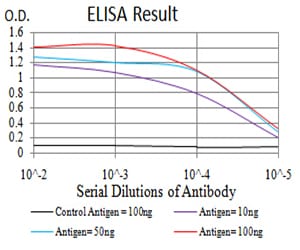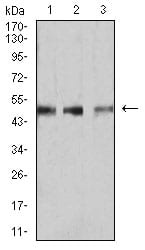

| WB | 咨询技术 | Human,Monkey |
| IF | 咨询技术 | Human,Monkey |
| IHC | 咨询技术 | Human,Monkey |
| ICC | 技术咨询 | Human,Monkey |
| FCM | 咨询技术 | Human,Monkey |
| Elisa | 1/10000 | Human,Monkey |
| Aliases | BSP1; JV41; BSP-1; JV4-1; MADH1; MADR1 |
| Entrez GeneID | 4086 |
| clone | 7G11G7 |
| WB Predicted band size | 52kDa |
| Host/Isotype | Mouse IgG1 |
| Antibody Type | Primary antibody |
| Storage | Store at 4°C short term. Aliquot and store at -20°C long term. Avoid freeze/thaw cycles. |
| Species Reactivity | Human,Monkey |
| Immunogen | Purified recombinant fragment of human SMAD1 (AA: 1-110) expressed in E. Coli. |
| Formulation | Purified antibody in PBS with 0.05% sodium azide |
+ +
以下是关于SMAD1抗体的3篇参考文献示例(部分信息基于典型研究归纳,建议通过学术数据库核实完整内容):
---
1. **文献名称**:*"SMAD1 signaling is critical for initial commitment of germ cell lineage from mouse pluripotent stem cells"*
**作者**:Ohinata Y., et al.
**摘要**:本研究利用SMAD1特异性抗体,通过免疫荧光和Western blot分析,揭示了SMAD1在小鼠多能干细胞向生殖细胞谱系分化中的关键作用。抗体用于检测SMAD1蛋白的磷酸化状态,证实其在BMP信号通路中的激活机制。
2. **文献名称**:*"Dysregulation of SMAD1 expression in breast cancer bone metastasis"*
**作者**:Kang Y., et al.
**摘要**:通过免疫组织化学(IHC)结合SMAD1抗体,研究发现乳腺癌骨转移组织中SMAD1表达显著上调,并与TGF-β介导的成骨分化相关。该抗体验证了SMAD1在肿瘤微环境中的定位及临床预后意义。
3. **文献名称**:*"SMAD1 interacts with Notch signaling to regulate cardiomyocyte differentiation"*
**作者**:Klaus A., et al.
**摘要**:利用SMAD1抗体进行染色质免疫沉淀(ChIP)实验,发现SMAD1与Notch通路协同调控心脏祖细胞分化。研究强调了SMAD1在心脏发育中的表观遗传调控功能。
---
建议通过PubMed或Google Scholar搜索具体文献时,使用关键词“SMAD1 antibody application”或结合研究领域(如“SMAD1 cancer” “SMAD1 ChIP”)获取最新文章。
The SMAD1 antibody is a crucial tool in studying the SMAD family of proteins, which are central mediators of transforming growth factor-beta (TGF-β) and bone morphogenetic protein (BMP) signaling pathways. SMAD1. a receptor-regulated SMAD (R-SMAD), is primarily activated by BMP receptors through phosphorylation of its C-terminal serine residues. Once activated, SMAD1 forms a complex with SMAD4. translocates to the nucleus, and regulates the transcription of target genes involved in embryonic development, cell differentiation, and tissue homeostasis. Dysregulation of SMAD1 has been implicated in various pathologies, including cancer, vascular disorders, and skeletal abnormalities.
SMAD1 antibodies are widely used in biomedical research to detect and quantify SMAD1 protein expression, phosphorylation status, and subcellular localization. These antibodies enable techniques such as Western blotting, immunofluorescence, immunohistochemistry, and chromatin immunoprecipitation (ChIP). Specific clones or polyclonal preparations may target distinct epitopes, including phosphorylated (p-SMAD1) or total SMAD1. allowing researchers to investigate activation dynamics or steady-state levels.
The development and validation of SMAD1 antibodies require rigorous testing for specificity, cross-reactivity, and sensitivity, as SMAD proteins share structural homology. Applications span developmental biology, cancer research, and regenerative medicine, where SMAD1's role in BMP-driven processes—like osteogenesis, angiogenesis, and stem cell differentiation—is pivotal. Commercial antibodies often cite validation in knockout models or siRNA-treated cells to confirm target specificity.
×